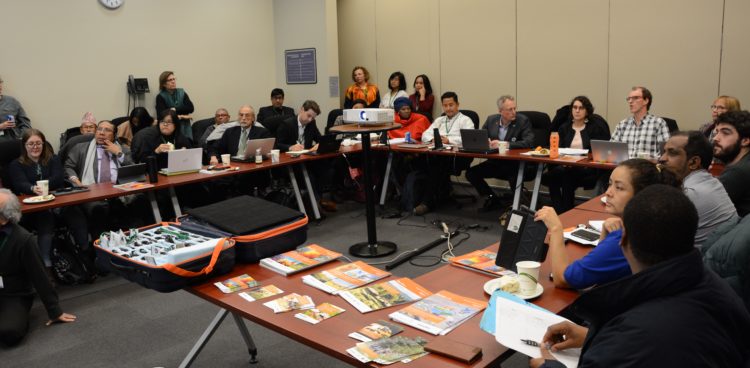 Story highlights
Story highlights
- The side event was co-hosted by Asia Indigenous Peoples Pact, the Forest Peoples Programme, International Development Law Organization, Natural Justice, and the Secretariat of the Convention on Biological Diversity, and SwedBio, and included presentations from individuals from each orgnaization
- Presentations focused on how to include and implement an integrated human rights-based and ecosystem-based approaches in the post-2020 biodiversity framework
- SwedBio is co-hosting a workshop to continue the discussion about how to best integrate human rights into the post-2020 global biodiversity framework
The year 2020 marks a new era for biodiversity. The United Nations Decade on Biodiversity comes to an end, making way for a new biodiversity framework. In developing a post-2020 global biodiversity framework for the Convention on Biological Diversity (CBD), and in seeking to create a more just world, it is evident that all voices must be heard when cultivating an equitable and sustainable planet.
In November 2019, SwedBio, along with the Asia Indigenous Peoples Pact (AIPP), the Forest Peoples Programme (FPP), the International Development Law Organization (IDLO), Natural Justice, and the Secretariat of the CBD, hosted a side event at the 11th meeting of the Ad Hoc Open-ended Working Group on Article 8(j) and Related Provisions of the Convention on Biological Diversity (CBD) in Montreal, Canada.
The event, ‘Human rights for thriving indigenous peoples, local communities and healthy ecosystems in the post-2020 global biodiversity agenda,’ showcased presentations from the hosting organizations, and was attended by 48 individuals from more than 30 different international organizations.
A human rights-based and ecosystem-based approach
Human rights depend on healthy ecosystems, and healthy ecosystems depend on biodiversity. A human rights-based approach is an inclusive approach that applies four principles: non-discrimination, participation, transparency, and accountability.
An ecosystem approach views ecosystems as both contributing to and maintaining cultures, societies and communities. Nature and culture are interdependent of each other. In an ecosystem approach, it is important to have policies, laws, and institutions in place at all levels of governance, as well as full public participation in decision-making that supports ecological and socio-economic sustainability.
Weaving human rights-based and ecosystem-based approaches in the post-2020 global biodiversity framework is a way to address biodiversity loss. SwedBio aims to contribute to the preparation of the post-2020 global biodiversity framework through working with these two approaches.

Making the case for human rights in the post-2020 global biodiversity framework
In the workshop, Maurizio Fahran Ferrari, from FPP, discussed what was learned from last years’ collective efforts of Indigenous Peoples and local communities (IPLC) to compile their experiences from contributing to the CBD implementation during the last decade. In the second edition of the Local Biodiversity Outlooks (LBO), Ferrari pointed out that one of the key messages is the need to respect the human rights of IPLC to govern their ecosystems.
Tanya McGregor, from the CBD Secretariat, highlighted that gender must be better incorporated into the post-2020 framework. Furthermore, McGregor pointed out that for indigenous women, their rights need to be strengthened to recognise their knowledge, practices and sharing of benefits. Human rights are particularly lacking for indigenous women, and changes in their circumstances can have major impacts on their wellbeing. Women are much more vulnerable than men, as well as to men. Killed environmental rights defenders are more likely to be women.
Bringing these perspectives together, Pernilla Malmer from SwedBio, highlighted how human rights depend on healthy ecosystems, and healthy ecosystems depend on biodiversity. She talked about how SwedBio dialogues have been used to share knowledge about difficult conversations, such as human rights and the post-2020 biodiversity framework.
Lakpa Nuri Sherpa, from AIPP, presented a case example from Hin Lad Nai, Thailand, and how their community forest was destroyed by logging in 1986. The community partnered with other communities and through their collective actions the forest recovered. They were formally recognized for their actions.
Nuri Sherpa also talked about how studies have shown that biodiversity is more protected in indigenous territories. Despite the value of the natural resources safeguarded by indigenous peoples, there is little representation and consideration by central governments. International and scientific communities are starting to recognise indigenous and local knowledge, such as in the Intergovernmental Science-Policy Platform on Biodiversity and Ecosystem Services’ (IPBES) Global Assessment. However, there is still a need for governments to recognise IPLCs as knowledge holders.
In a pre-recorded video, Robert Kibugi, of IDLO, talked about participation and inclusion being key for human rights. Using environmental impact assessments (EIAs), have proven to be effective for human rights and healthy ecosystems. He also discussed tools to help mainstream the human rights-nature-sustainable development nexus in the private sector, as presented in the SwedBio report Human right to a healthy environment for a thriving Earth.
Towards the post-2020 global biodiversity framework
In continuing to explore how to best integrate human rights into the post-2020 global biodiversity framework, SwedBio is co-hosting a workshop prior to CBD’s second Open-Ended Working Group on the Post-2020 Global Biodiversity Framework (OEWG2) in Rome, Italy. The aim of the workshop will be to explore the importance of including human rights-based approaches in the post-2020 global biodiversity framework, as well as ways to realise this.
The workshop will be held from 18-20 February in Chiang Mai, Thailand, and is co-convened by: Asia Indigenous Peoples Pact, Deutsche Gesellschaft für Internationale Zusammenarbeit GmbH on behalf of the German Federal Ministry for Economic Cooperation and Development, Forest Peoples Programme, International Development and Law Organization, Natural Justice, SwedBio, and United Nations Environment Programme.
The outcomes of this workshop will be presented at the CBD OEWG2 in Rome, 24 – 29 February 2020.

 Pernilla Malmer
Pernilla Malmer Henrik Brundin
Henrik Brundin Private: Tristan Tyrrell
Private: Tristan Tyrrell